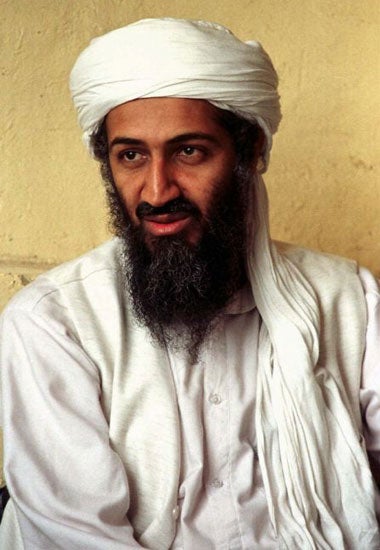Bin Laden: Where is he? Who's protecting him? Why can't we find him?
The latest audiotape proves the al-Qa'ida figurehead has pulled off one of the most remarkable disappearing acts in history. By Raymond Whitaker and Justin Huggler

An audiotape from the al-Qa'ida figurehead was broadcast on al-Jazeera, just days after an unsuccessful American missile strike aimed at his deputy, Ayman al-Zawahiri. The tape, certified as authentic by the CIA - presumably from voice pattern analysis - made no reference to the attack. But bin Laden discussed events of only a few weeks ago, including US opinion polls on Iraq and the claim that President George Bush had talked of bombing al-Jazeera's headquarters.
Not only did this show that the fugitive Saudi billionaire did not die in last autumn's south Asian earthquake, as some had suggested, his message also demonstrated that wherever he is, and whatever communications difficulties might exist, he is still taking a keen interest in affairs on planet Earth. So he must be savouring the tsunami of speculation that followed his re-emergence.
Some analysts commented that bin Laden's voice sounded more laboured, wondering whether this indicated a deterioration in his health. There was also a pronounced echo, as if he were speaking in a room, in contrast to previous recordings that seemed to have been made outdoors or in large spaces.
Then there was the content: an eye-catching, though vague, offer of a "truce" in Iraq and Afghanistan, on his terms, and a warning to Americans that al-Qa'ida was still seeking to attack them. For Michael Scheuer, the former head of the CIA unit dedicated to hunting him down, this was almost a specific threat to make a fresh attack on Washington. Al-Qa'ida failed to hit the Capitol building and destroy the Pentagon in 2001, said Mr Scheuer, pointing out that it had first attempted to destroy New York's World Trade Center in 1993 before returning to finish the job eight years later.
The US swiftly rejected any notion of a truce, with Vice-President Dick Cheney declaring: "I think you have to destroy them. It's the only way to deal with them." This was a mistake, in the view of Loretta Napoleoni, an expert on terror financing who recently published a book on Abu Musab al-Zarqawi, leader of al-Qa'ida in Iraq. "I think the US should have called his bluff," she said. "This tape was an attempt by the old leadership of al-Qa'ida to relaunch themselves. There is a power struggle between them and Zarqawi, and the US could have exploited it."
For George Kassimeris, senior research fellow in conflict and terrorism at Wolverhampton University, the response to the message fulfilled bin Laden's aims: "He wanted to show his followers he still calls the shots. What happened? He was front-page news. The US immediately replied to him, and the media around the US began reporting increased security as a result of his threats.
"The fact that he had been silent for a year increased the impact - if he spoke out too often, it would be less dramatic. Bin Laden is no longer in operational control of al-Qa'ida, but he doesn't want to be. He sees himself as a prophet, an ideological focus, not as a strategist or commander."
All the same, capturing or killing bin Laden or his deputy would be a priceless coup for a President who, as the al-Qa'ida leader noted, is losing support because of his entanglement in Iraq. But while the US or its allies have twice claimed to have got close to Zawahiri, there have been no such claims about bin Laden, who has pulled off one of the most remarkable disappearing acts in history.
There has not been a single confirmed sighting of him since the battle of Tora Bora, al-Qa'ida's last stand against the US invasion of Afghanistan in 2001. If "intelligence sources" are to be believed, he has not even shown up on America's electronic surveillance network. Not a satellite phone call. Not an email. Yet between them, he and Zawahiri have issued at least 28 video and audiotapes from hiding. Both of them were heard from last week.
So where are they? As this month's missile strike shows, the assumption is that they are still in the lawless border region between Pakistan and Afghanistan. The frontier runs 1,530 miles through some of the most rugged terrain on earth, and is inhabited by fearsome tribesmen who have no love for any outside interference from Kabul or Islamabad, let alone America.
For all the speculation that bin Laden might be sheltering in a Pakistani city, which is where other senior al-Qa'ida figures have been captured, or could have escaped by boat to Yemen or Saudi Arabia, his safety seems best assured by staying in an area where neither American nor Pakistani troops dare venture.
Even if he is finally hunted down, by this stage it would have little strategic impact. Bin Laden has already achieved what he set out to do, by creating al-Qa'ida. As an ideology, it is far more dangerous than a single group of conspirators.
Join our commenting forum
Join thought-provoking conversations, follow other Independent readers and see their replies
Comments
Bookmark popover
Removed from bookmarks